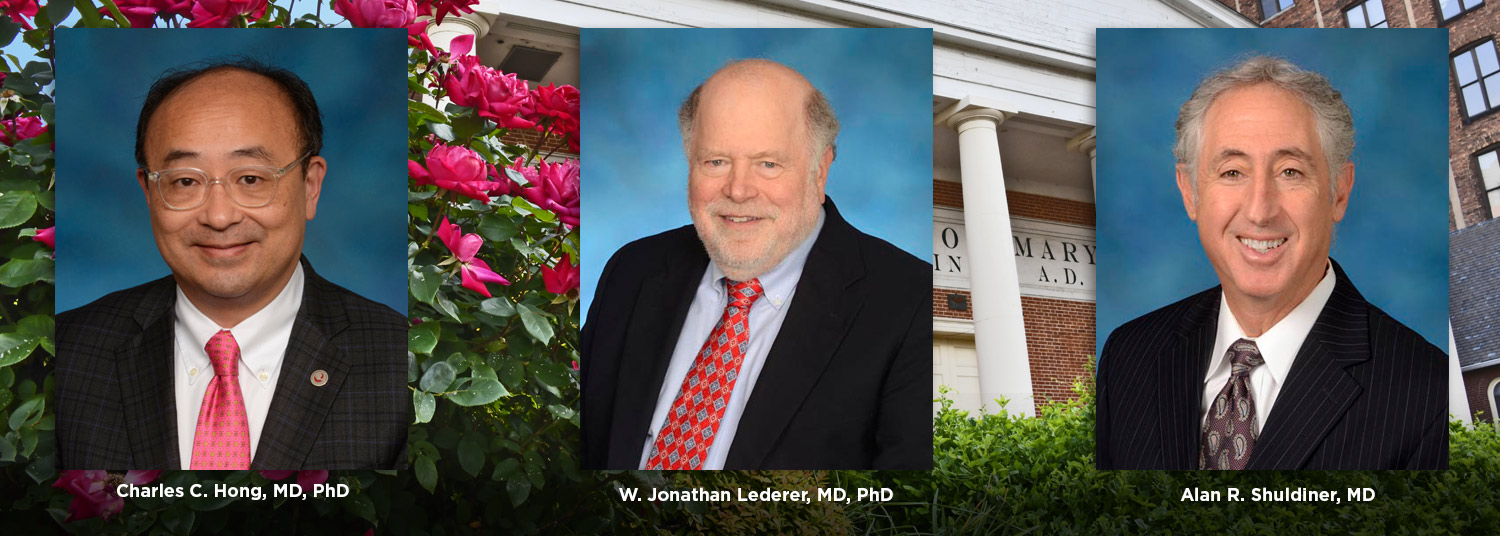February 01, 2021
Drs. Hong, Lederer, and Shuldiner Receive Prestigious Lifetime Honor from American Association for the Advancement of Science (AAAS)
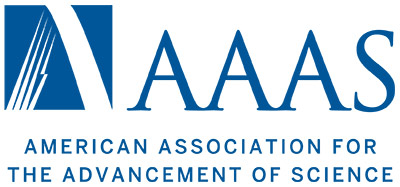 Three preeminent physician-scientists at the University of Maryland School of Medicine (UMSOM) have been named to an elite group of scientists, engineers, and innovators, as 2020 Fellows of the American Association for the Advancement of Science (AAAS). AAAS is the world’s largest multidisciplinary scientific society and a leading publisher of cutting-edge research through its Science family of journals.
Three preeminent physician-scientists at the University of Maryland School of Medicine (UMSOM) have been named to an elite group of scientists, engineers, and innovators, as 2020 Fellows of the American Association for the Advancement of Science (AAAS). AAAS is the world’s largest multidisciplinary scientific society and a leading publisher of cutting-edge research through its Science family of journals.
The new Fellows are Charles C. Hong, MD, PhD, the Melvin Sharoky, MD Professor in Medicine and Director of Cardiology Research; W. Jonathan Lederer, MD, PhD, Professor of Physiology, and Director of the Center for Biomedical Engineering & Technology; and Alan R. Shuldiner, MD, the John L. Whitehurst Professor of Medicine, Associate Dean for Personalized & Genomic Medicine, and Director of the Clinical Translation Sciences Institute. They are among the 489 distinguished scholars recognized this year by the AAAS for their “efforts toward advancing scientific applications that are deemed scientifically or socially distinguished.”
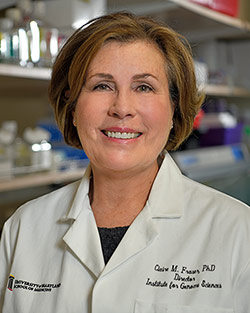 AAAS Fellows are selected annually for their contributions to their respective fields and the body of science. Newly elected Fellows are officially recognized for this lifetime honor at the ceremonial Fellows Forum, a time-honored event at the AAAS Annual Meeting, where they are presented with a certificate and blue and gold rosette. (This year’s inductees will be acknowledged at a virtual Fellows Forum on February 13, 2021.)
AAAS Fellows are selected annually for their contributions to their respective fields and the body of science. Newly elected Fellows are officially recognized for this lifetime honor at the ceremonial Fellows Forum, a time-honored event at the AAAS Annual Meeting, where they are presented with a certificate and blue and gold rosette. (This year’s inductees will be acknowledged at a virtual Fellows Forum on February 13, 2021.)
The current President of AAAS is UMSOM’s Claire M. Fraser, PhD, a pioneer in the field of microbial genomics, the Dean’s Endowed Professor, Department of Medicine, and Director of the Institute for Genome Sciences (IGS).
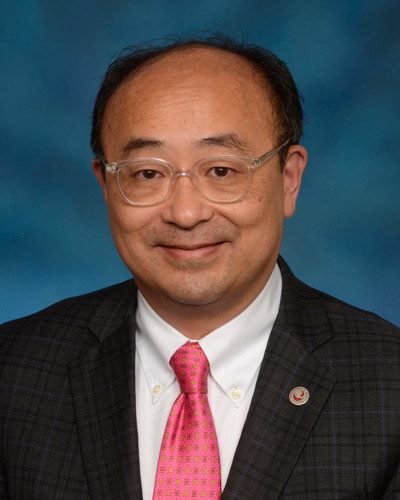 Dr. Hong was selected in the Biological Sciences area “for distinguished contributions in combining high-throughput chemical screening with developmental genomic investigations to discover the role of PI3K in artery-vein specification.” He is a physician-scientist whose research functions at the intersection of developmental biology, chemical biology, stem cell biology, and cardiovascular medicine. Dr. Hong’s work includes innovative chemical biologic approaches to study embryonic development as well as implementation of the induced pluripotent stem cell (iPSC) technology to better understand human cardiomyocyte biology and pathobiology at the cellular level.
Dr. Hong was selected in the Biological Sciences area “for distinguished contributions in combining high-throughput chemical screening with developmental genomic investigations to discover the role of PI3K in artery-vein specification.” He is a physician-scientist whose research functions at the intersection of developmental biology, chemical biology, stem cell biology, and cardiovascular medicine. Dr. Hong’s work includes innovative chemical biologic approaches to study embryonic development as well as implementation of the induced pluripotent stem cell (iPSC) technology to better understand human cardiomyocyte biology and pathobiology at the cellular level.
“I am humbled and honored to be elected as a Fellow of the American Association for the Advancement of Science,” he said. “I also am grateful to my mentors, who encouraged me to seek new methods to answer interesting questions, and to my mentees and collaborators for advancing our science together. I look forward to continuing my collaborative work with my colleagues at the UMSOM to discover new biology and perhaps develop new cures.”
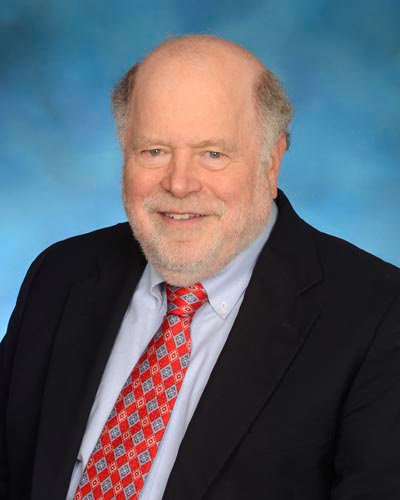 In the Medical Sciences area, Dr. Lederer was chosen “for contributions to our understanding of calcium signaling in cardiac, smooth and skeletal muscle, and fundamental discoveries in chemo-mechanical transduction, mitochondrial biology, and cardiac electrophysiology.” As a principal investigator for over 35 years, he has led his team to several key discoveries in calcium signaling, including the 1992 discovery of calcium sparks, the calcium signals in the heart that underlie all heart contractions, as well as all other muscles and excitable cells. Dr. Lederer’s discovery and subsequent study of calcium sparks have led to the development of a new area of research in local signaling events.
In the Medical Sciences area, Dr. Lederer was chosen “for contributions to our understanding of calcium signaling in cardiac, smooth and skeletal muscle, and fundamental discoveries in chemo-mechanical transduction, mitochondrial biology, and cardiac electrophysiology.” As a principal investigator for over 35 years, he has led his team to several key discoveries in calcium signaling, including the 1992 discovery of calcium sparks, the calcium signals in the heart that underlie all heart contractions, as well as all other muscles and excitable cells. Dr. Lederer’s discovery and subsequent study of calcium sparks have led to the development of a new area of research in local signaling events.
"Being elected to the AAAS Fellowship is a wonderful honor made sweeter by happening under the Presidency of Dr. Claire Fraser and alongside two delightful and generous colleagues now at the UMSOM – Dr. Charles Hong and Dr. Alan Shuldiner,“ said Dr. Lederer.
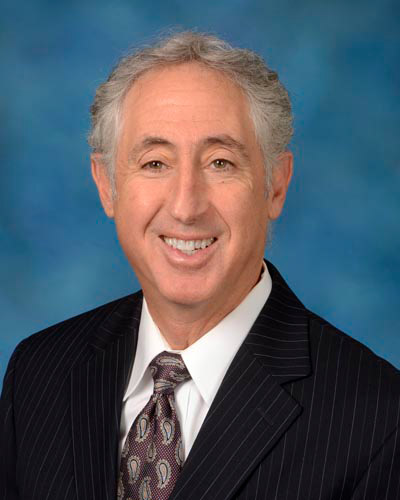 Dr. Shuldiner was lauded in the Biological Sciences area “for distinguished contributions and pioneering efforts in genetic studies of the Amish for type 2 diabetes, cardiovascular disease and pharmacogenomics.” A leading national expert and researcher in personalized medicine, Dr. Shuldiner focuses on the genetics of age-related diseases, including of type 2 diabetes, obesity, osteoporosis, and cardiovascular disease. He is best known for his studies involving Old Order Amish, a homogeneous population ideal for genetic studies.
Dr. Shuldiner was lauded in the Biological Sciences area “for distinguished contributions and pioneering efforts in genetic studies of the Amish for type 2 diabetes, cardiovascular disease and pharmacogenomics.” A leading national expert and researcher in personalized medicine, Dr. Shuldiner focuses on the genetics of age-related diseases, including of type 2 diabetes, obesity, osteoporosis, and cardiovascular disease. He is best known for his studies involving Old Order Amish, a homogeneous population ideal for genetic studies.
"I am so pleased to be recognized by my peers as a 2020 AAAS Fellow,” said Dr. Shuldiner. “Really the credit for this honor goes to an amazing multidisciplinary team of basic scientists, clinical researchers, support staff, and trainees that I have been blessed to work with over the years, the unselfish participation of thousands of subjects and patients in research, and the unwavering support of leadership at the University of Maryland School of Medicine."
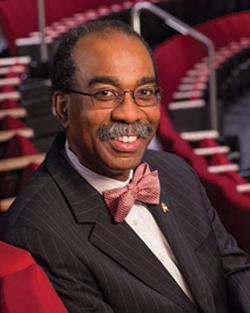 E. Albert Reece, MD, PhD, MBA, Executive Vice President for Medical Affairs, UM Baltimore, and the John Z. and Akiko K. Bowers Distinguished Professor and Dean, University of Maryland School of Medicine., expressed his pride at the news of the selection and said: “This is a tremendous, well-deserved honor for these outstanding physician-scientists, who have each made major scientific breakthroughs in their respective fields. I offer my sincere congratulations to each of them, as they truly represent our mission of discovery-based medicine.”
E. Albert Reece, MD, PhD, MBA, Executive Vice President for Medical Affairs, UM Baltimore, and the John Z. and Akiko K. Bowers Distinguished Professor and Dean, University of Maryland School of Medicine., expressed his pride at the news of the selection and said: “This is a tremendous, well-deserved honor for these outstanding physician-scientists, who have each made major scientific breakthroughs in their respective fields. I offer my sincere congratulations to each of them, as they truly represent our mission of discovery-based medicine.”
About the University of Maryland School of Medicine
Now in its third century, the University of Maryland School of Medicine was chartered in 1807 as the first public medical school in the United States. It continues today as one of the fastest growing, top-tier biomedical research enterprises in the world -- with 46 academic departments, centers, institutes, and programs, and a faculty of more than 3,000 physicians, scientists, and allied health professionals, including members of the National Academy of Medicine and the National Academy of Sciences, and a distinguished two-time winner of the Albert E. Lasker Award in Medical Research. With an operating budget of more than $1.2 billion, the School of Medicine works closely in partnership with the University of Maryland Medical Center and Medical System to provide research-intensive, academic and clinically based care for nearly 2 million patients each year. The School of Medicine has nearly $600 million in extramural funding, with most of its academic departments highly ranked among all medical schools in the nation in research funding. As one of the seven professional schools that make up the University of Maryland, Baltimore campus, the School of Medicine has a total population of nearly 9,000 faculty and staff, including 2,500 students, trainees, residents, and fellows. The combined School of Medicine and Medical System (“University of Maryland Medicine”) has an annual budget of over $6 billion and an economic impact of nearly $20 billion on the state and local community. The School of Medicine, which ranks as the 8th highest among public medical schools in research productivity (according to the Association of American Medical Colleges profile) is an innovator in translational medicine, with 606 active patents and 52 start-up companies. In the latest U.S. News & World Report ranking of the Best Medical Schools, published in 2021, the UM School of Medicine is ranked #9 among the 92 public medical schools in the U.S., and in the top 15 percent (#27) of all 192 public and private U.S. medical schools. The School of Medicine works locally, nationally, and globally, with research and treatment facilities in 36 countries around the world. Visit medschool.umaryland.edu
Contact
Office of Public Affairs
655 West Baltimore Street
Bressler Research Building 14-002
Baltimore, Maryland 21201-1559
Contact Media Relations
(410) 706-5260

